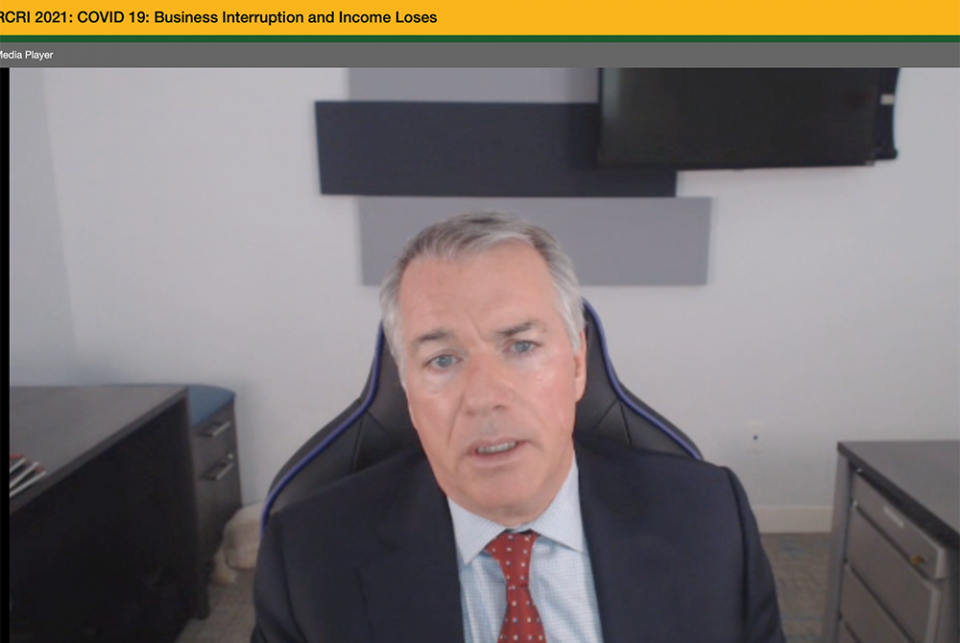RCRI - COVID business loss Waldorf.png

The novel coronavirus impacted religious orders on almost every level, whether it was ministries that had to pivot or close, precipitous drops in donations, or even just disruptions in communal life.
The question, a risk manager says, is whether congregations will learn from the experience and be prepared for the next natural disaster.
Stephen Waldorf, a principal partner and managing director of Waldorf Risk Solutions, which only works with nonprofit and religious organizations, told attendees at the Resource Center for Religious Institutes' annual conference Oct. 27 that the SARS outbreak in 2003 was a wake-up call to the insurance industry, even if it wasn't for the general public.
"They could see that it wasn't an if, it was a when it would happen again," Waldorf said. "This is when insurance carriers that didn't already have a pandemic exclusion began writing them" — meaning any financial losses caused by COVID-19 would not be covered by insurance, unless the organization bought specific coverage for endemic disease.
The RCRI annual conference, a gathering of religious and lay professionals attending workshops on topics such as changes in employment law and cybersecurity, was to be held in Orlando, Florida, but is being held virtually because of the coronavirus pandemic. The conference runs Oct. 26-28.
Many religious communities already had a large online presence before the pandemic began in March 2020, Waldorf said, and they were able to easily change to online fundraising and other activities. Congregations and nonprofits that relied on in-person and event-based fundraising, however, saw donations drop 22% from the year before.
"Most [organizations] had to deal with a serious move away from congregating in public. That impacted them dramatically," he said. "It was a big learning curve, unfortunately."
In addition to the disruption to ministries and other activities, the pandemic also changed communal life dramatically.
"Many religious sheltered in place in their bedrooms — it was a very isolated, cloistered sort of life," Waldorf said. "We became monastic, whether we wanted to or not."
Advertisement
Advertisement
Waldorf said any insurance companies that did not exclude pandemics from coverage at the start of the novel coronavirus are adding it.
In addition, the liability insurance market has been hit with billions of dollars in claims as states changed their statutes of limitation to allow lawsuits over sexual abuse, bringing a flood of litigation. Most of the claims were for abuse from decades before, and many insurance companies no longer held the reserves to pay them, Waldorf said, so the payments had to come from operating funds. That double-whammy means liability insurance will become harder to get, cover fewer incidents, and be more expensive.
At the same time, the property insurance industry is reeling from historic levels of natural disaster damage: 2017 saw $133 billion in claims, $62.7 billion in 2018, and $74 billion in 2020. Most years, property losses total less than $30 billion, he said; in 2021 there has already been $90 billion in losses so far.
"The insurance market is responding — unfortunately, not in the best way," Waldorf said, predicting higher deductibles, lower coverage limits, fewer things covered, and all of it much more expensive. "Rates across all lines of coverage have been [rising] and continue to escalate. You should anticipate some kind of rate increase, some kind of change."
The key to all of this, he said, is to be prepared for natural disasters, regardless of insurance coverage and regardless of whether they are pandemics, earthquakes or storms.
"If we suddenly had to isolate for, say, two weeks, what would we need?" Waldorf said, citing items such as food, medicines, fuel, and batteries. And two weeks is the minimum.
"I don't think anyone expected stay at home orders, and certainly not for the length of time they were in place," he said. "Unfortunately, there will be a next time."
Other sessions Oct. 27 included a look at the future of religious orders sponsoring long-term care; an Oct. 28 session will address issues faced by contemplative orders implementing the new norms given in the instruction Cor orans. The conference ends Oct. 28 with a Mass celebrated by Cardinal Joseph Tobin.
Like what you're reading? Sign up for GSR e-newsletters!


